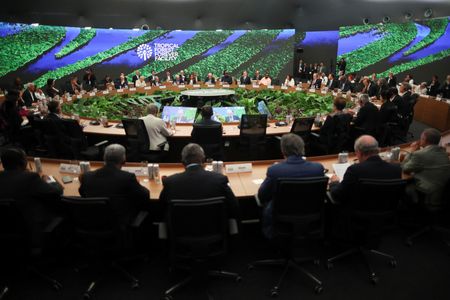WARSAW (Reuters) – Poland’s higher social, health and defence spending requires sustained fiscal adjustment to reduce the budget deficit and avoid excess demand, the Organisation for Economic Co-operation and Development (OECD) said in a report on Tuesday.
The OECD sees Poland’s economy expanding by 3.4% in 2025 and 3% in 2026, supported by improving demand from abroad, falling inflation and an eventual gradual easing of interest rates.
The report recommends ensuring that monetary policy remains sufficiently restrictive to bring inflation to target in the medium-term, amid pressures from a robust labour market and strong wage growth.
“Fiscal support measures, combined with additional spending on social policies, health and defence, have opened up a substantial fiscal deficit,” the OECD said in the report.
The OECD sees Poland’s 2025 fiscal deficit remaining broadly similar to the 5.8% of GDP in 2024. It said the government’s plan to lower the general government deficit-to-GDP ratio by around one percentage point annually over 2026-28 was “ambitious” and likely to dampen growth.
“Achieving a prudent fiscal path will require reducing expenditures and boosting tax revenues, while ensuring sustainable pension provision and adequately funding the green transition,” the report said.
According to the OECD, Poland could boost revenues by changing the property tax to value-based from area-based, taxing vehicles according to emissions, raising fuel duties, restricting preferential VAT rates and hiking environmental taxes.
It also suggested reviewing Poland’s universal family benefits and cutting benefits for those on higher incomes.
Poland’s headline inflation has fallen sharply from a peak in early 2023, but it has rebounded since coming within target in the first half of 2024 and core inflation remains elevated amid a tight labour market and strong wage growth, the OECD said.
“While the economy has been recovering since mid-2023 as inflation declined, inflationary pressure from the relatively robust labour market suggests that monetary policy should remain sufficiently restrictive to ensure that inflation durably returns to target,” it said.
The report said with the withdrawal of the remaining government energy support measures in the second half of 2025, headline inflation is projected to rise to 5% in 2025 before falling to 3.9% in 2026.
(Reporting by Karol Badohal; Editing by Ros Russell)











